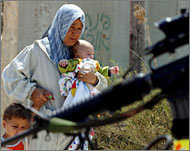Amnesty condemns Israeli barrier
Palestinians are facing devastating social and economic consequences as a result of Israel’s construction of a wall in the occupied West Bank, Amnesty International has said.

In a report released by the human rights group on Monday, Amnesty also condemned Israel for creating a dire situation in which about 60% of Palestinians live below a poverty line of $2 per day.
The barrier, cutting off the West Bank from the Jewish state, is a damaging blow to the lives of 200,000 Palestinians, said the report, Israel and the Occupied Territories: Surviving Under Siege.
“The barrier/fence cuts off scores of Palestinian villages from the rest of the West Bank or from their farming land. The land in these areas is among the most fertile in the West Bank, with better water resources than elsewhere,” it said.
Israel says the barrier is aimed at preventing resistance fighters from reaching its areas.
But Palestinians fear the wall, set to surround Jewish settlements in the West Bank, could demarcate the borders of a future state.
“Had they been building (the barrier) on the (pre-1967 war) line obviously we wouldn’t have anything to say about it but they’re building it inside occupied territories, separating Palestinian communities,” said Donatella Rovera, an Amnesty delegate who headed research for the report.
Unprecedented restrictions
The report held Israel directly responsible for the “high levels of unemployment, poverty, malnutrition and other health problems,” afflicting Palestinians.
 |
|
Civilians punished collectively for |
The London-based human rights watchdog accused Israel of collective punishment, saying “hundreds of thousands of Palestinians cannot be made to pay for the crimes of a handful of individuals”.
Israeli restrictions on the movement of Palestinian civilians and goods in the occupied Gaza Strip and West Bank have reached an “unprecedented level” since the start of the Intifada against Israel’s occupation in September 2000, said Rovera.
“Closures, blockades, checkpoints, roadblocks, curfews and other restrictions have had a disastrous impact on the lives of Palestinians in the West Bank and Gaza Strip, and have crippled the Palestinian economy,” said the report.
It also said a US-backed “road map” aimed at ending the Palestinian-Israeli conflict has done little to ease the lives of civilians.
“Only a handful of more than 300 checkpoints and roadblocks have been lifted,” said the report.
Amnesty warned repercussions on civilians were not easily reversible.
“Even in the unlikely scenario things improve dramatically overnight, the damage is everlasting,” said Rovera. “The students will need to catch up, the businesses will have to start up again.”